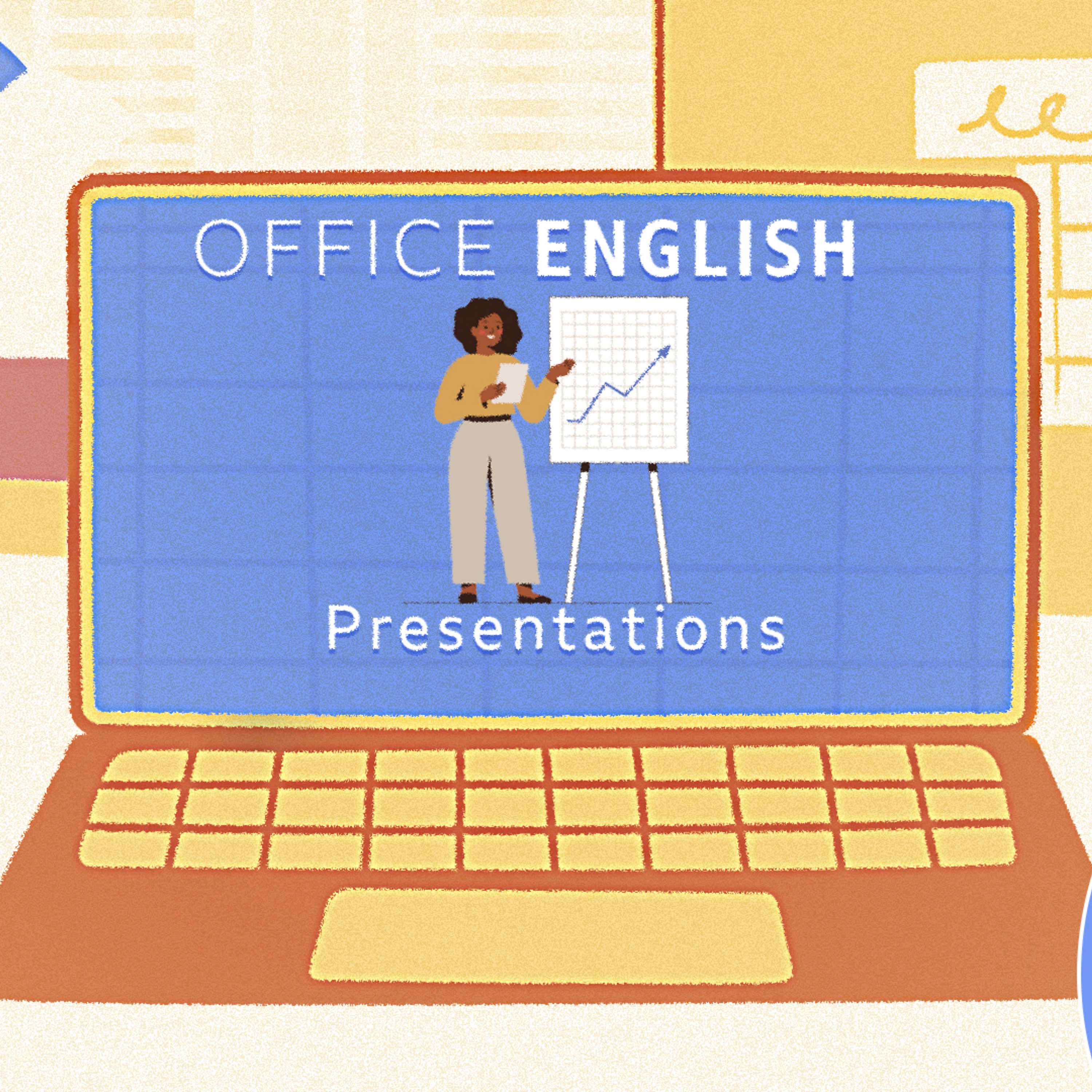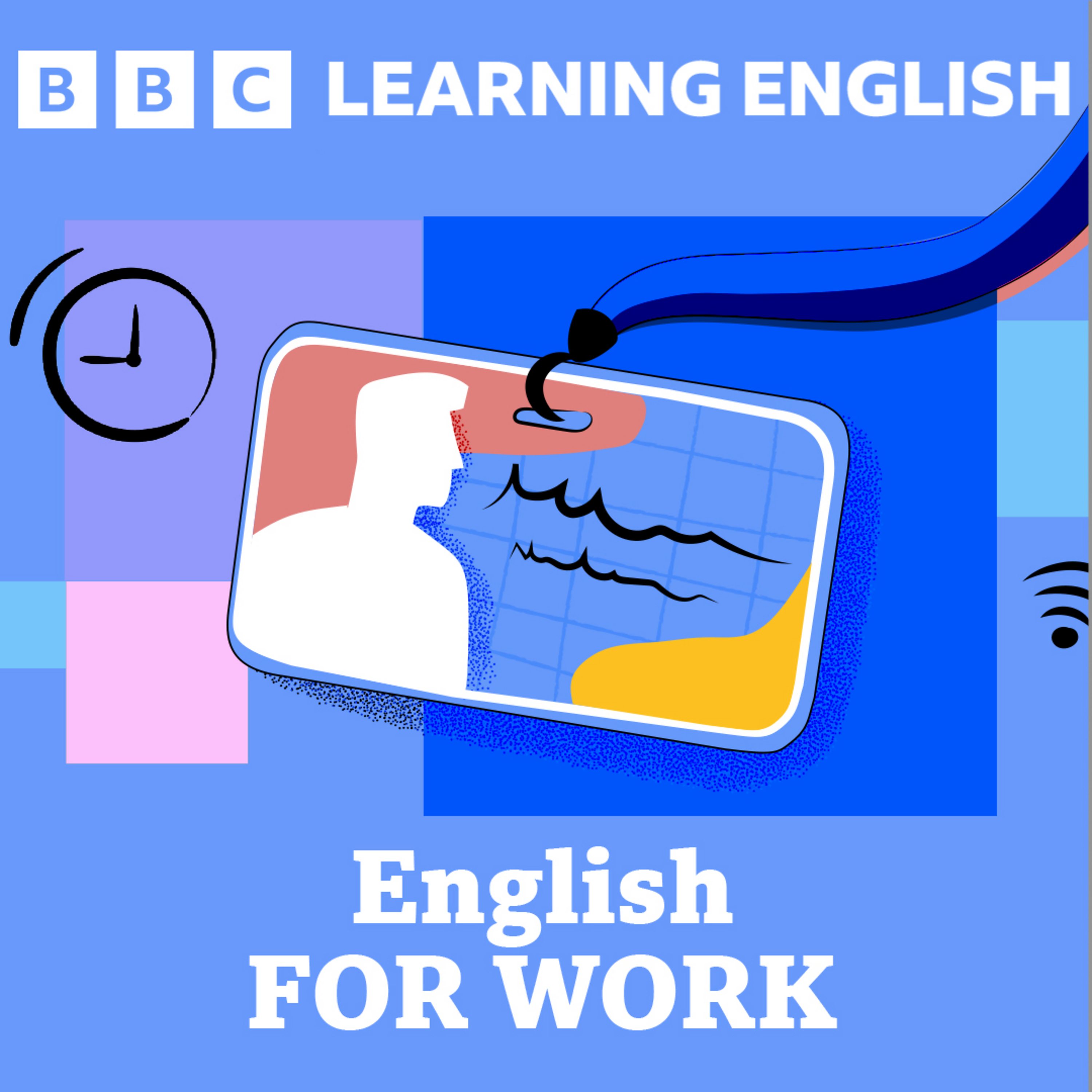
Office English: Presentations

Learning English For Work
Deep Dive
- Fear of public speaking is a common problem.
- Preparation and structure reduce nervousness.
- Knowing the topic makes presentations easier.
Shownotes Transcript
Listen now wherever you get your BBC podcasts.
Do you like public speaking at work? I have never liked public speaking. It's actually been a really big problem for me. Not knowing what to say and just forgetting your words, that's my biggest fear. It's scary, isn't it? That fear of judgment, your colleagues judging what you're saying. If I've practiced enough, if I know the topic I'm talking about, it is a lot easier, I think. Today on Office English, we're talking about giving presentations at work.
Hello. Welcome to a new series of Office English, your podcast guide to the world of work. I'm Phil. And I'm Pippa. Find a transcript for this episode on our website, bbclearningenglish.com. We heard at the start of the programme from some of the BBC Learning English team about how they deal with public speaking. It's something lots of people find difficult. How do you find it, Pippa?
sure. I think I always think I'm not going to be nervous about it until the last minute and then sort of half an hour before I have to speak or give a presentation. I'm really nervous. How about you? I find I need to have a structure. If I've got a presentation that I've practiced, I can do it easily. And I'm not usually that worried by it. But if
if I just have to chat with everyone at the beginning I find that a bit more daunting. Yes I guess the trick is to prepare well and that's something that Georgie and Andrew talked about. So we can look at some of the language today that you can use to keep your presentation on track and prepare. Okay let's start with opening a presentation. What are some good ways to start?
Well, I guess it's good to start by introducing yourself. So, I would say I'm Pippa and I work on the podcast at BBC Learning English. So, who you are and what you do. Yes, yeah. And it's also, I think, good to talk about the topic you're going to be talking about, as you might be saying. Today, I'll be covering discovering new markets.
Yes. And one thing that some people like to do is start with a question. So you might say something like, what's the best way to satisfy our customers? So you want to kind of set up what you're going to talk about and engage your audience. They might not be that interested in what you have to say. Yes. Yes.
Right, we've started our presentation. Now, let's look at some ways we can make the presentation engaging and exciting. Now, that could be the structure. We talked about starting with a question. So, if you do that, make sure that you give the answer and that will keep people engaged and listening for it.
You can also use some language to kind of help make your presentation more interesting. So you can use emphasis phrases. So for example, if I was talking about marketing in the presentation, I might say, we found that red posters are not only more likely to be seen by customers, they're more likely to be remembered too. So there I've got this kind of structure of not only and to. So I've kind of
kept people interested in why red posters are important. And the third thing could be something we call the rule of three. We can often make things memorable by giving them in groups of three. So you might say how to find new customers, how to make them happy and how to get profit from them. Giving three ideas is often much more memorable. Often at the end of a talk or presentation, you'll be asked some questions by the audience.
Yes, and people often find this stressful, even native speakers of English, because it's much harder to prepare for what an audience will ask you. But there are some techniques you can use. So the classic way is to give yourself some thinking time. Oh, that's an interesting question. When it comes to... And that's bought you a few seconds that you can use to think about your answer.
Yeah, another phrase like this you can use is saying, funny you should ask that. And that's just given you a moment to kind of think about that question. I also think you don't need to be afraid to pause briefly before you answer a question. Sometimes people panic and rush into the answer before they've really thought about it. And of course, sometimes you just don't know the answer. And it's often best just to be honest there and say something like,
In all honesty, I don't know the answer to that offhand, but let me research and get back to you. Yes, and that word offhand, that means I don't know that without kind of looking at my notes. I don't know that off the top of my head. So, giving a presentation at work can be stressful. Let's hear from our BBC colleagues again. Try and think about at the end of the day, it's not that big of a deal in the grand scheme of things if you can just be relaxed and...
Just be positive. You'll get through it okay. My tip would be to just think what really is the worst that can happen. If the worst is that you're going to feel a bit embarrassed, you're going to survive. Life goes on. It's going to be fine.
Both Georgie and Andrew try to feel more confident by imagining a worst-case scenario, because this can be reassuring. You realise that it's just a presentation, it's not the end of the world. Yes, and it's also useful because it means you can look at your presentation in a different way, see if there are any problems with it, and it might suggest some questions that people might ask that you hadn't thought of before.
That's it for this episode of Office English. You can find more programmes to help you with your English at work on our website. Try our series on business jargon, which explores the strange language of the world of work. Visit bbclearningenglish.com. We'll be back next week and we'll be talking about when to delegate or give instructions at work. See you then. Bye. Bye.
I'm Zing Singh. And I'm Simon Jack. And together we host Good Bad Billionaire. The podcast exploring the lives of some of the world's richest people. In the new season, we're setting our sights on some big names. Yep, LeBron James and Martha Stewart, to name just a few. And as always, Simon and I are trying to decide whether we think they're good, bad or just another billionaire. That's Good Bad Billionaire from the BBC World Service. Listen now wherever you get your BBC podcasts.